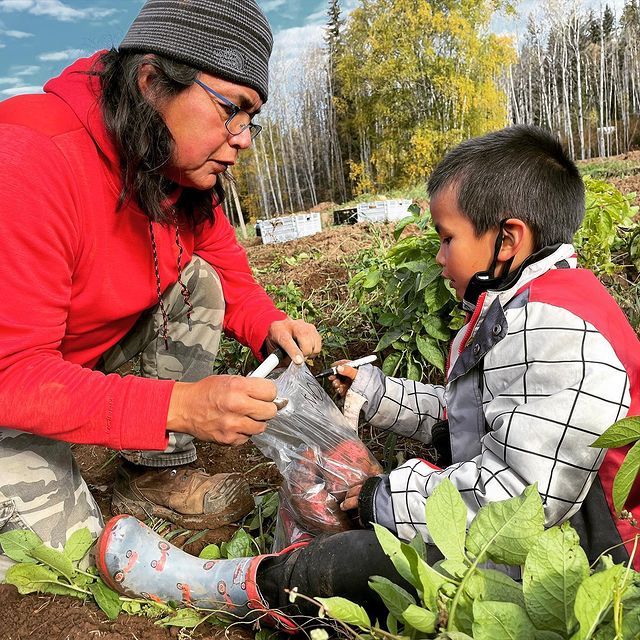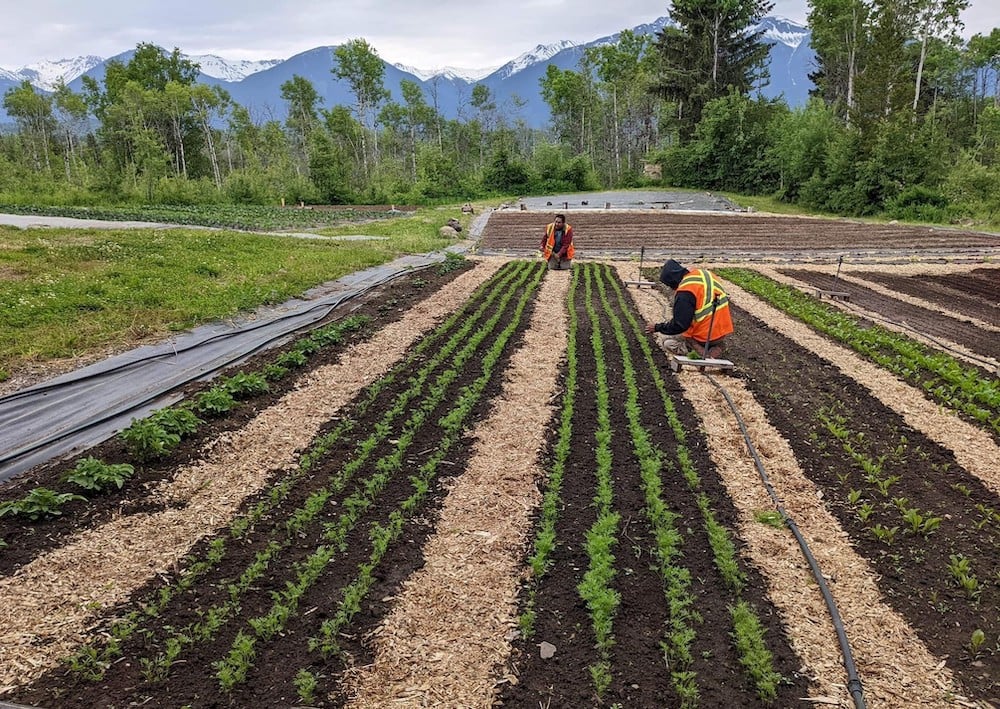Jacob Beaton didn’t grow up on a farm. “I knew nothing about farming,” he says. “I started gardening, just for personal healing, but to be honest, I wasn’t a very good gardener.”
That’s a surprising statement from Beaton who, along with his wife Jessica Ouellette, moved to the 140-acre Tea Creek Farm, located just outside of the village of Kitwanga, in northwestern B.C., in 2018. In just a few short years, they’ve nurtured a growing farm business that produces and gifts up to 20,000 pounds of produce annually, but have also created an innovative training program that is building food sovereignty among Indigenous communities in northern B.C.
Jeannie Parnell, regional co-ordinator of the Northern First Nations Alliance, nominated Tea Creek Farm for the Food Lands Land Award for their land-based, culturally safe model, which has benefited all six communities of the NFNA. Tea Creek Farm was honoured in a ceremony on June 9 at the Anvil Centre in New Westminster.
When Beaton and Ouellette moved with their two sons to Tea Creek, their plan was to homestead. “We wanted to expand our own personal food sovereignty,” explains Beaton. “Our goal was just to have enough potatoes for the year in our root cellar.”
They arrived at the farm in October, and Beaton spent their first winter immersed in self-directed agriculture studies, watching YouTube videos about farming methods and travelling to the U.S. to tour farms.
His efforts paid off: in 2019, their first year, Tea Creek produced a huge surplus of food, which they distributed to their community. In 2020, with COVID-19 exacerbating food scarcity issues in the North, other First Nations came to ask Beaton for help. “They asked us to come grow food for them,” Beaton recalls, “And we said, well, we can’t do ours and yours, but if you send people to us, we’ll teach them to do what we do.”
Beaton realized that trainees would need to learn more than just agricultural methods. “During the pandemic, we couldn’t get seeds,” he explains. “Our seed orders were shorted and they took forever to come. We needed to start creating our own resiliency beyond farming — from construction, to seeds, to machines, to plumbing. That’s how we really got off the ground.”
Food insecurity is an issue across B.C.: just over one in 10 households is food insecure, and one in six children experience food insecurity. But those numbers are much higher for Indigenous communities, nearly half of which are food insecure.
Creating sustainable local food systems is essential, particularly as the climate crisis worsens, but Tea Creek’s mission is bigger than just ensuring that Indigenous communities have enough food: their Food Sovereignty Training program focuses on self-esteem, skills training, cultural revitalization and community care. Trainees also learn business skills, nutrition and trades like carpentry, machine operation and plumbing, providing them with the foundation they need to implement food sovereignty projects in their own communities.
“We’re mostly growing people,” Beaton jokes, when asked about the crops at Tea Creek. “That’s our priority.”
The farm operates on a Monday to Friday schedule. Trainees arrive in the morning and some are picked up by Tea Creek employees, since many Indigenous people in the North don’t have access to personal transportation, and public transportation is not available. Right now, Beaton says, they have about 45 trainees, though only about 15 can be on site at a time. They start each day with a hot breakfast and a safety circle.
“That includes safety on site and cultural safety,” says Beaton. “There’s no teasing, no bullying. We accept people as they are.”
Trainees cycle through hands-on, one-hour lessons: a typical day might include an hour of heavy machine inspection, followed by carpentry, soil health, orchard care and learning how to run a wood chipper. Each day finishes with a closing circle. In addition to the training program, over a thousand Indigenous people visited Tea Creek last year to learn about their methods.
The farming methods that Tea Creek teaches are gentle and sustainable.
“We’re finding ways to work with what we have,” Beaton explains. “We teach people how to work with the natural soil biologies, and boost the soil they have. We start with hand-farming methods, which are the least expensive way to farm.” Getting the costs of fertilizers and weed suppression as “close to zero as possible,” says Beaton, helps to make farming more affordable, so they teach composting methods and mulching for weed control.
“It’s going to be a dead-end if we just teach methods that are expensive. So we say, here’s how we grow vegetables for as close to free as possible. We want people to fill their basements with food they can eat all winter,” Beaton says.
Tea Creek also teaches tractor farming. “If you need to suddenly feed a thousand people, the only way you can do that is through tractors,” he says. This year, he plans to purchase tractor attachments that mimic hand-farming methods, and hopes to build an on-site compost facility.

The biggest barrier, says Beaton, is funding. “We’ve only got about four months of funding, and it took us about eight months to raise it.” As a result, the 2022 training programs planned for January started in May. Beaton says the holistic Tea Creek model confounds funders, who don’t understand why they give so many rides or offer everyone who visits the farm a hot meal. Some of their non-Indigenous funding partners, he says, “Just want us to have people sitting in healing circles. That’s their idea of what we should be doing.” Private donors allowed Tea Creek to keep their lights on over the winter, but he hopes that they can secure more resources. “It just doesn’t seem to be a priority to fund food sovereignty or food security or Indigenous people… and we do all of those things.”
But for now, Beaton is focused on the mission: building food sovereignty, one community at a time. “One of our training groups completely overhauled their community garden using our methods,” he says. “It went from very minimal production to very high production. I was told that all the schools and elders and everyone in the community came out to see it. It just gives people a ton of hope.”
“Like: look what we can do in a small garden. Imagine if we had a whole field. We could grow all the food we need for our community in just one field.” ![]()
Read more: Indigenous, Food
This article is part of a Tyee Presents initiative. Tyee Presents is the special sponsored content section within The Tyee where we highlight contests, events and other initiatives that are either put on by us or by our select partners. The Tyee does not and cannot vouch for or endorse products advertised on The Tyee. We choose our partners carefully and consciously, to fit with The Tyee’s reputation as B.C.’s Home for News, Culture and Solutions. Learn more about Tyee Presents here.

















Tyee Commenting Guidelines
Comments that violate guidelines risk being deleted, and violations may result in a temporary or permanent user ban. Maintain the spirit of good conversation to stay in the discussion.
*Please note The Tyee is not a forum for spreading misinformation about COVID-19, denying its existence or minimizing its risk to public health.
Do:
Do not: